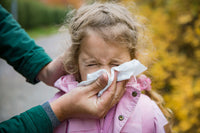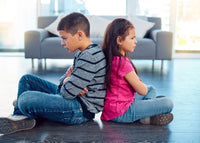By Kathryn Peck
Potty training your little one? Trying to get your toddler to at least take one bite of the carrot on their plate? Or just struggling to get siblings to stop bickering? For me, it’s all of the above right now. And all of the above have caused me to lose my temper … on more than one occasion.
Why is trying to potty train a stubborn toddler so frustrating? And why does it take me raising my voice for anyone to listen?
The moment always passes and I feel better - sometimes even guilty for getting so angry. But I often wonder if I’m not the only one stressed about the expectations of potty training and dinnertime? Are my own frustrations being felt by others? Yes, probably.
The moment always passes and I feel better - sometimes even guilty for getting so angry. But I often wonder if I’m not the only one stressed about the expectations of potty training and dinnertime?
Experts say that getting upset is a physical response as much as it is an emotional one. The stress hormones that kick in are, in fact, the same ones that trigger the body’s fight-or-flight response;
when your body prepares for action, it’s a response designed to protect your body in an emergency that requires a quick reaction, not when you’re trying to get your toddler to eat their carrots, however.
If you’re like me, first, you’re only human, and second, this blog is for you. Here are 5 exercises to keep in mind so when tempers begin to flare, as they often do in parenthood, you have an outlet to help soothe the body and the mind of both you and your child.
- Take a deep breath. Many experts say this is the number one thing you can do to relieve stress and anxiety.I actually ask my kids to do this a lot; I ask the little ones to “blow out a birthday candle three times” so that they can breathe deeply and reset.Try a breathing exercise that requires you to take a deep breath in, and exhale slowly and fully, eventually slowing so that your exhalation is twice as long as your inhalation.
-
Use your senses & get grounded. This is a simple exercise that involves each of your five senses and will, in the end, force you to slow down and bring an awareness back to your body and back to the present. It’s similar to the 3-3-3 rule for anxiety, which asks you to focus on three things grounded with three senses. More simply, take a few minutes to name one thing you can see, smell, taste, touch, and hear, with a few breaths in between.
For younger children, going through each of the five sense might be too much. Try a simple fist squeeze instead. Have your child breath in and squeeze their fists as tight as they can. On the exhale, have them open their hands slowly and softly. Repeat several times.
-
Move your body. Stretch or take a walk; physical activity releases serotonin that helps you calm down and feel better. Fresh air can also help to relieve stress. Not only will the fresh air help calm you, but also the change of scenery can sometimes interrupt a mounting anxious thought process.
If you’ve got little ones, going outside isn’t always that easy (shoes, coats, hats…). Have them try the “Rock, Roll and Rest” exercise inside to get their body moving. Sitting or lying down, have them hug their knees to their chest and close their eyes. Next, have them rock sideways, forward, and backward, all the while breathing deeply. After a few minutes, release the arms and legs and relax.
- Challenge your thoughts. So much about a parent’s or child’s anxiety often stems from unfounded or “worst case scenario” thoughts. My 8-year-old is often caught up in the “what if” cycle (e.g. what if tomorrow is a gym day and I not dressed right?) in which there are no immediate solutions. For me, one irrational thought leads to another then another then another, which can lead one to feel overwhelmed with all these unchecked and escalating thoughts. Identify the thoughts that are at the root of the stress, and then identify a more realistic replacement for it.
-
Listen to music. Music can trigger a variety of chemical reactions in your brain that contribute to relaxation. It can reduce stress-inducing hormones and prompt the release of dopamine in your brain. Dopamine is a neurotransmitter (a.k.a. the body's chemical messengers) that actually promotes feelings of happiness and excitement; it helps to regulate your mood.
Aside from your favorite playlists, there are all kinds of relaxing music for kids and parents out there. Just take a moment to search “calm kids music” and you’ll find loads of resources on YouTube, Amazon, and more.
-
About the author: Kathryn is the owner of Bicycle Pie and mom of 4 little ones. Also a writer, editor, and former owner of one of Boston's premiere baby boutiques, she continues to write about motherhood, children's products, family life, and all other things that test our skills and patience as parents.
Photo credit: iStock.com/AsiaVision




